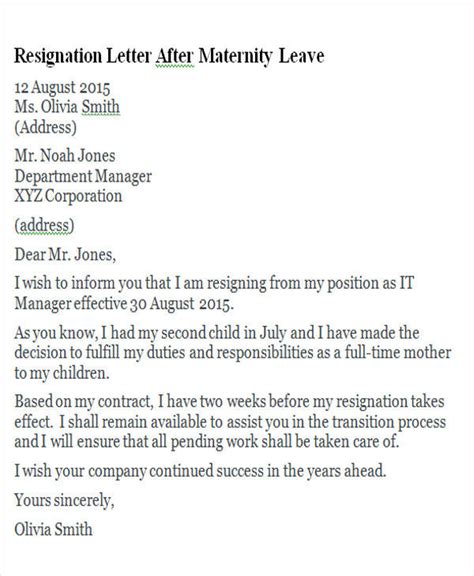Resignation Letter During/After Maternity Leave: A Guide

Maternity leave is a time for new mothers to bond with their baby and adjust to the new role of parenthood. However, some mothers may find themselves in a situation where they need to resign from their job. Writing a resignation letter during or after maternity leave can be challenging, but it is an essential step in ensuring a smooth transition for both the employee and the employer. In this guide, we will provide you with all the information you need to write a resignation letter during or after maternity leave.
Why Resigning During/After Maternity Leave is Challenging
Resigning during or after maternity leave can be challenging for several reasons:
- Maternity leave can be a time of emotional and physical adjustment, and the decision to resign may be difficult to make.
- Employers may have policies and procedures that need to be followed, and it can be confusing to navigate them while on leave.
- Resigning during or after maternity leave may have financial implications, such as loss of benefits or income.
When to Resign During/After Maternity Leave
The timing of your resignation is crucial. Here are some factors to consider:
- Give your employer as much notice as possible to ensure a smooth transition.
- Consider your financial situation and ensure you have a plan in place for income and benefits.
- Think about your personal and professional goals and how they align with your decision to resign.
How to Write a Resignation Letter During/After Maternity Leave
Writing a resignation letter during or after maternity leave may seem daunting, but it doesn’t have to be. Here are some tips:
1. Keep it Simple and Professional
Your resignation letter should be straightforward and professional. Keep the tone positive and avoid any negative comments about the company or your colleagues.
2. Be Clear and Concise
State your intention to resign clearly and include the date of your last day of work. It is also essential to include your contact information and offer to help with the transition process.
3. Express Gratitude
Express your gratitude for the opportunity to work with the company and for their support during your maternity leave. This will help maintain a positive relationship with your employer.
4. Address Any Outstanding Issues
If you have any outstanding issues, such as unused vacation time or benefits, address them in your resignation letter. It is essential to be clear about what you expect to receive and when.
5. Proofread Carefully
Before sending your resignation letter, proofread it carefully to ensure there are no errors or typos. This will help you maintain a professional image and ensure that your message is clear.
FAQs
Q. Can I resign while on maternity leave?
A. Yes, you can resign while on maternity leave. However, it is essential to consider your financial situation and ensure you have a plan in place for income and benefits.
Q. How much notice should I give?
A. It is best to give your employer as much notice as possible. Check your employment contract for the notice period requirement.
Q. Do I have to return to work after maternity leave if I intend to resign?
A. No, you do not have to return to work if you intend to resign. However, it is essential to check your employment contract and company policies to ensure you are following the correct procedures.
Q. Can I negotiate my resignation terms?
A. Yes, you can negotiate your resignation terms. However, it is essential to remain professional and avoid any negative comments or demands.
Conclusion
Resigning during or after maternity leave can be a challenging decision to make. However, following the tips and guidelines in this guide can help you write a professional resignation letter and ensure a smooth transition for both you and your employer.
